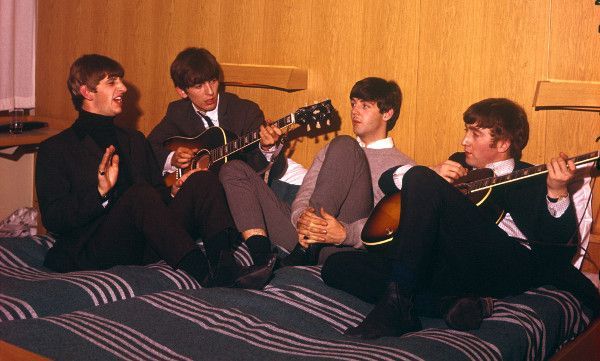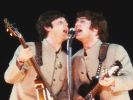Eye For Film >> Movies >> The Beatles: Eight Days A Week - The Touring Years (2016) Film Review
The Beatles: Eight Days A Week - The Touring Years
Reviewed by: Angus Wolfe Murray

Ron Howard is a director (Apollo 13), actor (Happy Days), dad (Bryce Dallas Howard). He is also a nice man and this is a nice film.
He's not interested in gossip; neither is he attracted to scandal. He sees The Beatles as a phenomenon and wants to know more.

He has the eyes and the mind of a fan, which is not to say that Eight Days A Week is some kind of homage to the mob tops that ignores personality clashes and avoids asking difficult questions about Brian Epstein's sexuality, or mind altering drugs. It is a documentary, something new for Howard, with interludes of a sound bitten nature from Whoopie Goldberg, Elvis Costello, Richard Curtis, Sigourney Weaver ("I was in love with John"), Eddie Izzard, et al.
It's about the tours, especially in America where Beatlemania became far greater than anything Presley had to endure. They invented stadium concerts, filling Shea to the rafters, if it had any rafters, which it didn't, leaving 5000 disappointed teenagers outside. Vox had to build special speakers for this gig, which was nothing like the extravaganzas you see today, simply four young men in suits on a bare stage.
The biography of the band is here if you bat away the banter and explore the accidents of time and place that took these rough edged rockers from the dungeon sweat pit of The Cavern Club in Liverpool to the red light district in Hamburg to being "discovered" by a record shop owner's son ("Brian was class. He had a car") who smartened them up and paid for their first single (Love Me Do) from which everything evolved, thanks in part to Maureen Cleave's rave in London's Evening Standard and later the discipline of George Martin's musical input.
Things emerge from this affectionate movie that may come as a surprise. The reason that fame did not squeeze the sense out of them appears to reflect certain aspect of a shared working class childhood - both John and Paul lost their mothers during their teens - as well as a Liverpudlian sense of the absurd.
They were very close. Decisions were made jointly. Ringo was not a passenger, nor a convenient add on, after their first drummer left. George's song writing was never dismissed as inadequate. They were sensitive to other people's feelings, according to American TV anchor Larry Kane, who accompanied them on one of their tours. Acting stopped being fun after A Hard Day's Night and the live gigs became screamathons ("The music wasn't being heard. It was a freak show") and so they stopped.
They were bringing out a single every three months, an album every six, or at least that was the plan. John and Paul wrote almost 300 songs together, which, in some pundits' opinion, was the grounding that held them together. They were musicians before they were pop stars.
"You had to have faith," someone says.
And they did.
Reviewed on: 13 Sep 2016


















